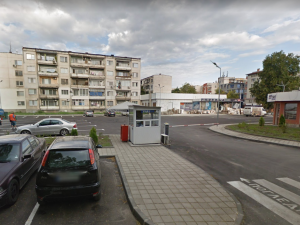Bulgarian Government Survives no-Confidence Vote Amid Corruption Allegations
By Archyde.com News Service
SOFIA, Bulgaria – The Bulgarian government, led by the Zhelyazkov cabinet, narrowly survived a no-confidence vote, the second such challenge it has faced. This latest attempt to oust the government centered on allegations of widespread corruption, a persistent issue in the Balkan nation. While the motion failed, opposition leaders have vowed to continue their efforts to hold the government accountable.
Opposition Leader Vows Further Action
Kostadin Kostadinov, leader of the “Revival” party, expressed his determination to continue challenging the government. ” ‘Renaissance’ by chance we insisted that the vote be about corruption, because it is the cancer of the Bulgarian state,” kostadinov told Bulgaria ON AIR. “the current cabinet is a projection of a policy that has been followed in the country for more than 30 years. If I start governing the state tomorrow, adn after three months I run the same people who have been violating the laws – whose people will be Appointed before.”
Kostadinov indicated that his party plans to introduce another no-confidence vote after May 1st, signaling an ongoing battle against the current administration.
Economic Woes and policy failures
Beyond corruption, the opposition is targeting other areas of perceived government failure.”There are many topics,” Kostadinov stated. “we can talk about energy and failure in the country’s policies, we can talk about internal security. The most current topic will be about failure in the country’s financial policy, because Bulgaria is currently facing bankruptcy. We have a collection in the first quarter of incomes – it has never happened before.”
Kostadinov painted a grim picture of the state of affairs, asserting that “there is no place in the state system that has not been rotten.” He further lamented the deteriorating infrastructure and it’s impact on the population.
“Our country is falling apart in front of our eyes and people die because of it,” Kostadinov said. “Our roads are falling apart, our cities are falling apart, our hospitals are falling apart, our airports – everything collapses. We live in a bubble in which our ruling bodies report how we will enter the euro area and everything will be decided. They see meaning from nothing.”
Shifting political landscape
Kostadinov also pointed to shifting dynamics within the bulgarian political system and potential external pressures.”We began to increase our support,” he noted. “At the first vote there were 52, on the other – 72. all it is indeed a matter of conversations. This government is a function of political incest. Such governments fall either after political pressure or pressure from outside. There is a serious conflict between the new administration of Donald Trump and the EC. State.”
The reference to a conflict between the Trump administration and the European Commission hints at potential geopolitical influences on Bulgarian politics. A divergence in policy between the U.S. and the EU could create opportunities or challenges for the Bulgarian government, depending on its alignment.
Counterargument: Stability vs. Change
while the opposition emphasizes the need for change and accuses the government of corruption and mismanagement, supporters of the Zhelyazkov cabinet argue that stability is paramount, especially in a volatile geopolitical surroundings. They contend that frequent no-confidence votes and political instability hinder Bulgaria’s ability to address pressing issues and attract foreign investment. some analysts suggest that while corruption is a legitimate concern, the opposition’s focus on no-confidence votes is primarily aimed at gaining political leverage rather than genuinely improving governance. this argument highlights the delicate balance between holding the government accountable and ensuring a stable political environment conducive to economic growth and growth.
Impact on U.S. interests
While seemingly distant, political instability and corruption in Bulgaria can have implications for U.S. interests. Bulgaria is a NATO member and a strategic partner in the Black Sea region. A weak and corrupt government can be vulnerable to external influence, perhaps undermining regional security and stability.Moreover, corruption can deter U.S. investment and hinder efforts to promote democratic values in the region. The U.S. government often provides assistance to Bulgaria to strengthen its democratic institutions and combat corruption, recognizing the importance of a stable and reliable partner in the region.
| Corruption Perception Index (CPI) Comparison (2023) | CPI Score (out of 100) | Global Rank |
|---|---|---|
| denmark (Least Corrupt) | 90 | 1 |
| United States | 69 | 25 |
| Bulgaria | 43 | 73 |
| Somalia (Most Corrupt) | 11 | 180 |
FAQ: Bulgarian Politics and Corruption
- Why is corruption a persistent problem in Bulgaria?
- Corruption in Bulgaria is rooted in a combination of factors, including weak institutions, a lack of transparency, and a legacy of communist-era practices. The transition to a market economy created opportunities for corruption, and patronage networks have become entrenched in the political system.
- What are the potential consequences of political instability in Bulgaria?
- Political instability can deter foreign investment, hinder economic growth, and weaken Bulgaria’s ability to address pressing social and economic challenges. It can also make the country more vulnerable to external influence and undermine its role as a reliable partner in the region.
- How does corruption in Bulgaria affect the United States?
- Corruption in Bulgaria can undermine U.S. efforts to promote democratic values and regional security in the Black Sea region. It can also deter U.S. investment and create opportunities for illicit activities, such as money laundering and transnational crime.
- What is the role of the European Union in addressing corruption in Bulgaria?
- The European Union has been working to address corruption in Bulgaria through various mechanisms, including monitoring reports, recommendations, and funding programs. The EU also provides technical assistance and support to help Bulgaria strengthen its institutions and combat corruption.
What specific reforms do you think are moast critical for Bulgaria’s future?
Interview: Analyzing Bulgaria’s Political Crisis and Corruption Challenges with Dr.Elena Petrova
Archyde.com News Service
Following the recent no-confidence vote against the Bulgarian goverment, Archyde’s news team sat down with Dr. Elena Petrova, a leading political analyst specializing in Eastern European affairs and the socio-economic impact of corruption, to delve deeper into the political crisis in Bulgaria. Dr. Petrova has advised several international organizations on governance and anti-corruption strategies.
The No-Confidence Vote and its Implications
Archyde: Dr. Petrova, thank you for joining us. The Bulgarian government has just survived another no-confidence vote. From your perspective, what are the primary drivers behind this ongoing political instability?
Dr. Petrova: Thank you for having me. The persistent instability is a symptom of deeper issues. At the heart of it lies the endemic corruption, coupled with economic challenges and the shifting geopolitical landscape. The opposition’s efforts are not just a push for power but a reflection of genuine public discontent over these issues. The recent vote highlights the need for reforms in Bulgarian politics. The Zhelyazkov cabinet needs to address corruption allegations from the opposition party.
Corruption Allegations and Economic Woes
Archyde: The article highlights allegations of corruption. How significant are these issues in undermining public trust and affecting Bulgaria’s economic prospects?
Dr. Petrova: Corruption is a cancer on the Bulgarian economy. it deters foreign investment, fuels brain drain, and erodes the rule of law. When businesses,both local and international,perceive a high level of corruption,they become hesitant to risk long-term investments. Furthermore, resources that should be allocated to public services, like infrastructure and healthcare, are diverted, exacerbating social inequalities.
Geopolitical Influences and External Pressures
Archyde: The article also touches on potential external influences. To what extent are geopolitical factors impacting the internal political dynamics in Bulgaria? The article mentions a conflict from the Trump governance.
dr. Petrova: Absolutely, external factors are significant, particularly considering bulgaria’s strategic location and its NATO and EU membership. The U.S., along with the European Commission, has a vested interest in a stable and democratic Bulgaria, wich can act as a barrier to the russian state. Potential shifts in U.S. foreign policy or a divergence between the U.S. and the EU could create a complex habitat, influencing the balance of power, and therefore Bulgaria’s policies.
Pathways Forward for Bulgaria
Archyde: What key steps should the Bulgarian government take to address the challenges of corruption, economic stagnation, and political instability?
Dr. Petrova: Primarily we want a strict autonomous judiciary. Anti-corruption agencies must be truly independent and empowered to investigate and prosecute. Increased transparency in government contracts, public finances, and the assets of public officials is crucial. economic reforms should include efforts to improve the buisness environment, attract foreign investment, and diversify the economy. A commitment to the rule of law, and to build public trust in Government.
The Role of the EU and International Community
Archyde: What specific role can international organizations and the EU play in supporting Bulgaria during this period?
Dr. Petrova: The EU can continue providing technical assistance, monitoring reports, and access to funds to support Bulgaria’s reform efforts.The EU can also focus on the use of these funds, ensuring that aid will not be misused through corruption. The international community can offer assistance and support to strengthen the institutions and promote good governance, while holding those accountable for corruption. International organizations can provide resources for judicial and police reform.
Looking Ahead: A call for reader participation
Archyde: Dr. Petrova, your insights have been invaluable. As a final thought: given the complex interplay of issues facing Bulgaria, what would be your message to the bulgarian people?
Dr. Petrova: It’s a call for active citizenship. Demand accountability from your leaders, support a free press, and be vocal about corruption. The power to improve Bulgaria’s future lies in the hands of its citizens. It is indeed essential to hold officials accountable.
What specific reforms do you think are most critical for Bulgaria’s future? We encourage readers to share their thoughts in the comments section below.







